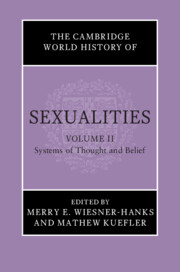Book contents
- The Cambridge World History of Sexualities
- The Cambridge World History of Sexualities
- The Cambridge World History of Sexualities
- Copyright page
- Contents
- Figures in Volume II
- Contributors to Volume II
- Editors’ Preface to the Series
- 1 Human Sexuality: The Evolutionary Legacy of Mating, Parenting, and Family Formation
- 2 Sexuality in Ancient Egypt: Pleasures, Desires, Norms, and Representations
- 3 Sexuality in the Systems of Thought and Belief of the Ancient Near East
- 4 Sexuality in Traditional South Asian Systems of Thought and Belief
- 5 Discourses of Desire in Ancient Greece and Rome
- 6 Writing a History of Sexuality for Pre-Modern China
- 7 Sexuality in Traditional Systems of Thought and Belief in Pre-modern Japan
- 8 African Traditions of Sexualities
- 9 Sexuality in the Traditional Systems of Thought and Belief of the Americas
- 10 Oceanic Sexualities: Persistence, Change, Resistance
- 11 Sexuality in Buddhist Traditions
- 12 Sexuality in Jewish Traditions
- 13 Sexuality in Christian Traditions
- 14 Sexuality in Islamic Traditions
- 15 Scientific Sex in the Modern World
- 16 Sexuality in Marxism and Socialism
- 17 Feminism and Modern Sexuality
- 18 Post-Colonialism and Sexuality
- Index
- Contents to Volumes I, III, and IV
- References
1 - Human Sexuality: The Evolutionary Legacy of Mating, Parenting, and Family Formation
Published online by Cambridge University Press: 26 April 2024
- The Cambridge World History of Sexualities
- The Cambridge World History of Sexualities
- The Cambridge World History of Sexualities
- Copyright page
- Contents
- Figures in Volume II
- Contributors to Volume II
- Editors’ Preface to the Series
- 1 Human Sexuality: The Evolutionary Legacy of Mating, Parenting, and Family Formation
- 2 Sexuality in Ancient Egypt: Pleasures, Desires, Norms, and Representations
- 3 Sexuality in the Systems of Thought and Belief of the Ancient Near East
- 4 Sexuality in Traditional South Asian Systems of Thought and Belief
- 5 Discourses of Desire in Ancient Greece and Rome
- 6 Writing a History of Sexuality for Pre-Modern China
- 7 Sexuality in Traditional Systems of Thought and Belief in Pre-modern Japan
- 8 African Traditions of Sexualities
- 9 Sexuality in the Traditional Systems of Thought and Belief of the Americas
- 10 Oceanic Sexualities: Persistence, Change, Resistance
- 11 Sexuality in Buddhist Traditions
- 12 Sexuality in Jewish Traditions
- 13 Sexuality in Christian Traditions
- 14 Sexuality in Islamic Traditions
- 15 Scientific Sex in the Modern World
- 16 Sexuality in Marxism and Socialism
- 17 Feminism and Modern Sexuality
- 18 Post-Colonialism and Sexuality
- Index
- Contents to Volumes I, III, and IV
- References
Summary
This chapter reviews what can be gleaned about human sexuality from the evolutionary and ethnographic record. Ancestral human sexuality leaves neither fossil nor archaeological evidence, but inferences about how humans mated, consorted, parented, formed partnerships, and aggregated into families can be drawn from two large and growing bodies of work, both discussed in this chapter. The first are anatomical and biological indicators of ancestral mating patterns inferred from fossil evidence as well as observations from nonhuman primates. The second is ethnographic research across an array of contemporary human societies, which highlights variation in mating, marriage, and family structure. Together, biological indicators and cross-cultural patterns shed light on the legacy, constraints, and possibilities carried forward into the diverse and variable expression of human sexuality today. Humans have a deep ancestry in a social structure of males and females living in social groups together, although how humans organize themselves is structurally different from anything observed in our closest relatives. Not only do families form around long-term pairbonds in all societies, but there is also a great deal of flexibility in who constitutes the pairbond, the families that surround them, and in the prevalence of extra-pair relationships.
Keywords
- Type
- Chapter
- Information
- The Cambridge World History of Sexualities , pp. 1 - 21Publisher: Cambridge University PressPrint publication year: 2024



